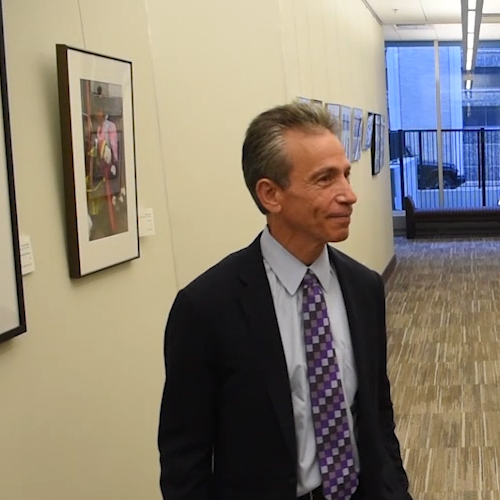Interview with The Riverside Company Co-CEO Stewart Kohl

Stewart Kohl is Co-CEO of The Riverside Company, a $10 billion global private equity firm focused on investing in the smaller end of the middle market. Prior to joining The Riverside Company in 1993, Kohl was a vice president of Citicorp Venture Capital, Ltd., the private equity arm of Citibank.
Stewart Kohl serves on the board of Oberlin College, the Museum of Contemporary Art Cleveland, and the Board of Trustees of Cleveland Clinic as well as its Wellness Institute Leadership Board. He was inducted into the Ohio Foundation of Independent Colleges Hall of Excellence in 2009. He previously served as Co-Chair of the Building for Hope Capital Campaign of the Center for Families and Children.
Stewart Kohl is a founding donor of VeloSano, a charity bike ride dedicated to eradicating cancer by supporting research at the Cleveland Clinic.VeloSano supports projects that will build upon and transition recent advancements in cancer research into new diagnostics and therapeutics with a high likelihood of leading to successful, future grant funding. In the first six years, VeloSanohas raised over $21 million which has been used to fund more than 125 cancer research projects. VeloSano raised more than $4.7 million in 2019, with 100% of the money raised supporting lifesaving cancer research at Cleveland Clinic.
We have an opportunity to share selected excerpts from recent interviews with Stewart Kohl where he shares his insights about private equity and minority-owned businesses and some of the biggest lessons he has learned over the course of his career.
The SBA reported that over 29 percent of all businesses are minority-owned and these businesses are growing several times faster than U.S. firms overall. What are some of the challenges facing these businesses? How do you see the role of private equity?
Given demographics, obviously, this should be a fast-growing part of our economy, and I think there's some evidence that it is. There are several private equity firms now that are focusing on investing in Hispanic companies, none of them in Cleveland today, although I hope some of them would be active here even if they're headquartered in Texas or California or other locations.
I think that more often than not, the impediments to success or growth among minority-owned businesses, women-owned businesses are the same as faced by every other business, and then they face these additional challenges that come, given the nature of their ownership. I still believe that private equity can be a great partner for them to help them overcome those challenges and succeed. I know at Riverside, we would be eager to do that.
In terms of our own firm, I would give us good marks in terms of achieving gender diversity within our own team and achieving some gender diversity among the management teams of the companies that we invest in.
I could be naïve, but I start from the perspective that private equity is a very good tool, partner, for these businesses. I don't see any reason it can't be. To attract private equity, they're going to have to do the same things or similar things to what any other business would do.
Again, in the case of Riverside, we're going to want to see that efficacy of the product and the authenticity. In fact, I could argue there, they have an advantage. If they're going to try to sell to, say, a Hispanic demographic, then being Hispanic-owned and having that authenticity should be a competitive advantage that we would recognize as an investor. Then they're going to have to be a well-run, well-advised and do the same things that any other business would do.
What are some of the biggest lessons you have learned over the years?
We learn far more from our mistakes. When things go well, you're just not forced to do the level of introspection. It doesn't hurt in the same way.
Whenever we exit a transaction, whenever we sell, we go and we do a deep dive, an introspection. But the ones where it doesn't work and tend to leave the most powerful lessons and we memorialize them in something we call lessons from the loo, L-O-O, the English word for bathroom. In Riverside offices around the world, there's a poster that has these lessons up on it.
Several times a day, in fact, for me it seems to be an increasing number of times each day, I am forced to stare at these lessons and be reminded of the mistakes that we've made. I've gotten to the point where I don't mind making mistakes. It's humbling. I still get it wrong after nearly four decades.I still get it wrong sometimes, and I'm humbled by that, but I accept that. What I have much more trouble accepting is when I make the same mistake again. I want to find new and creative ways to be wrong as long as long as I don't make the same mistakes twice. That level of introspection I think goes across the firm, around the world.
Not so long ago, we had our annual investors conference and stood up before all of our investors, and had one of the sessions that we have ever year, called Lessons from the Losers, where we take these, one of these lessons from the loo from a recent loss, and lay it out just as clearly as we know how to our investors, and God bless our investors, because these are sophisticated people. None of them have ever come up to me afterwards and said, "Boy, how stupid were you. What were you thinking?" They all say, "Thank you for your candor. We know you make mistakes. We make mistakes. We're really heartened to see that you actually are trying to get better."
Subscribe to Latin Post!
Sign up for our free newsletter for the Latest coverage!
© 2025 Latin Post. All rights reserved. Do not reproduce without permission.











